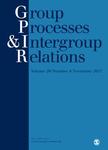版权所有:内蒙古大学图书馆 技术提供:维普资讯• 智图
内蒙古自治区呼和浩特市赛罕区大学西街235号 邮编: 010021

作者机构:Univ London Royal Holloway London England Univ Pittsburgh Pittsburgh PA USA Catholic Univ Croatia Zagreb Croatia Univ Western Ontario London ON Canada Univ London Inst Study Power Crime & Soc Dept Law & Criminol Egham TW20 0EX Surrey England
出 版 物:《GROUP PROCESSES & INTERGROUP RELATIONS》 (团体效应与团体间关系)
年 卷 期:2024年第27卷第4期
页 面:946-966页
核心收录:
学科分类:0402[教育学-心理学(可授教育学、理学学位)] 0303[法学-社会学] 12[管理学] 1204[管理学-公共管理] 03[法学] 030301[法学-社会学]
基 金:UKRI [EP/X02170X/1] Horizon Europe Guarantee [EP/X02170X/1] Funding Source: UKRI
主 题:group dynamics identity fusion Relational Models theory secrets
摘 要:Personal secrets are a ubiquitous fact of group life, but the conditions under which they are revealed have not been explored. In five studies, we assessed secret disclosure in groups governed by four models of human sociality (Communal Sharing, Equality Matching, Authority Ranking, Market Pricing;Fiske). In Studies 1a and 1b, participants indicated their willingness to disclose secrets in hypothetical groups governed by the models. In Studies 2a and 2b, participants rated how much a group in which they disclosed secrets or nonsecrets is governed by the models. In Study 3, participants indicated their disclosure of various types of secrets in Communal Sharing and Equality Matching groups to which they belonged. Across studies, disclosure was most strongly associated with Communal Sharing, followed by Equality Matching. Study 3 further showed that identity fusion predicted disclosure in these two kinds of groups. Implications for understanding disclosure of personal secrets in group contexts were discussed.